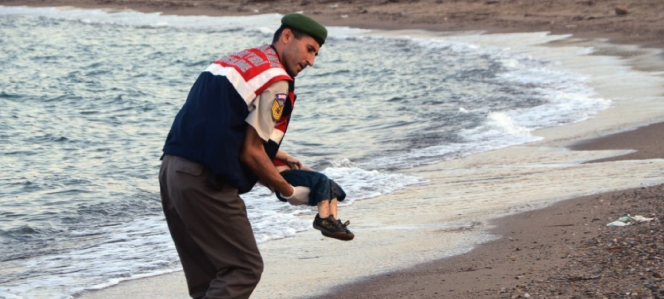It’s 2 am, and I just laid my precious baby back down in his crib after his middle-of-the-night feeding. My cheeks are wet with tears, as has so often been the case during his first three months of life. So many times, I look at his beautiful, miraculous little body and am overcome by every tiny feature— the way his fresh hair wisps over his forehead and glistens as the sun lands on that wrinkled, pensive forehead; the thousands of shapes his lips take as he stretches and coos and smacks and smiles while testing out his recently discovered voice; the soft, pillowy touch of his skin that forms into little chubby rolls on his herky jerky arms. But this morning, the tears are almost uncontrollable.
This morning, as I fed my little baby, I read about that precious Syrian boy whose body washed ashore on the beach in Turkey. I saw the photos of his beautiful, dark hair curled around his ears, wearing his little red t-shirt and blue shorts, his arms tucked beneath his body and his sweet, innocent face in the sand. I thought about the way my baby’s body goes completely limp and lifeless as he falls asleep and I carry him to his crib, lifting his arm playfully and letting it drop to his side… but how I can lift his warm little cheek to mine and bury my face in his neck, waking him up with my kisses. I wanted to scoop up that precious boy on the shore, to take him from the arms of that soldier that carried him, to hold him so tightly and kiss him so much that he might wake up, might kick those tennis-shoed feet and stand up, running like little boys do into the arms of his grief-stricken father. In that little boy, I saw my little boy, and I couldn’t stop —can’t stop—crying. Because of my Kolbe, Aylan’s death is personal.
I don’t know how to fix this. I certainly don’t know nearly enough about what is going on in Syria and am disappointed in myself for that. I don’t know how to help these persecuted people beyond saying prayers and changing my Facebook status and Googling “Top 5 Ways You Can Help the Syrians.” I don’t know how to stop the persecution or address the injustice in any comprehensive way. I am convicted by my comfort, and I know it. I will have to deal with that in the days to come. But I’m not writing this to make excuses or to propose a political solution. There are plenty of resources for that on your Facebook feed.
We are a culture of security, comfort, and preservation – emotionally, financially, politically. We express condolences; we shake our heads and purse our lips at the tragic, the “real shame”s, and then we go about our business. We are grateful that it isn’t us, and while that gratitude is not misdirected, we hide behind its stability as a reason not to dwell on the pain. We tell ourselves that we simply cannot, that if we mourned and fretted over “this” single instance, we would have to do that for the next instance, too, and we can’t live every moment of our lives in grief! And so we become calloused and numb. We let our dealings become impersonal. But true compassion is “suffering with,” and it won’t allow us these callouses. It is the ability to assume another’s burden so completely that it becomes real, becomes personal, becomes one’s own, and thereby relieves the other of the full weight of the burden. And, it is essential to love.
God grants us deep, abiding love in close relationships not so that we can revel and wallow in them, closing them off from the world and protecting them from its advances, but so that those relationships can teach us how to treat the stranger. He gives us spouses, friends, and children not so that we can distinguish “ours” from “theirs” but so that we might literally learn to love in a way that opens our hearts to all of his children. He is teaching us to love as he loves. Seeing ourselves in our brother’s suffering is the way that we train ourselves to see Christ in one another. But this is not something that always happens naturally. Often, we must deliberately and willfully act without emotional prompting. But he gives us a catalyst; he helps us carry the analogy to its conclusion: “Amen, I say to you, whatever you did for one of these least brothers of mine, you did for me.” We are called to see Christ’s face on the faces of those who suffer—on the Syrians, on little Aylan. But until we get there, we can start by seeing our babys’ faces on his face, for Christ calls us to that higher love by means of these earthly relationships. And he calls us to act accordingly.
So, I’m writing this to you this morning as a plea: make this tragedy personal. Let it wash over you and haunt you, let it shake you to tears. See your face on the face of Aylan’s father and feel the heaving sighs of his uncontrollable tears; see your child’s feet filling those tiny shoes. For this will change the way you love.
